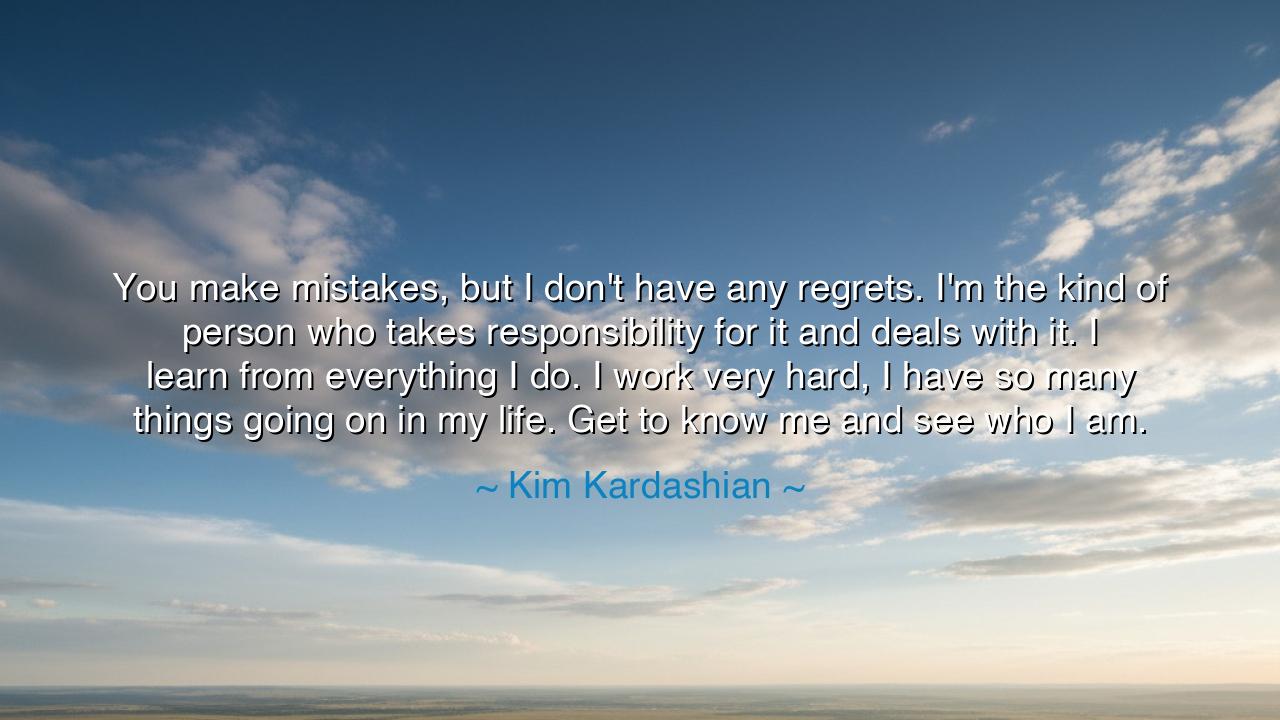
You make mistakes, but I don't have any regrets. I'm the kind of
You make mistakes, but I don't have any regrets. I'm the kind of person who takes responsibility for it and deals with it. I learn from everything I do. I work very hard, I have so many things going on in my life. Get to know me and see who I am.






“You make mistakes, but I don't have any regrets. I'm the kind of person who takes responsibility for it and deals with it. I learn from everything I do. I work very hard, I have so many things going on in my life. Get to know me and see who I am.” — Thus spoke Kim Kardashian, a woman often judged by the surface of her fame, yet whose words reveal the deeper spirit of endurance and self-knowledge. Beneath the brightness of the modern world, this saying carries an ageless truth: that life is not meant to be free from error, but to be lived through responsibility, learning, and perseverance. For even among the ancient philosophers, it was taught that perfection is not the absence of mistake, but the courage to grow from it.
To make mistakes is to be human. From the earliest days of civilization, the wise have said that the soul matures not through ease, but through trial. Every error is a mirror, showing us where pride, haste, or inexperience cloud our judgment. Yet it is not the fall that defines a person, but what they do when they rise. Kim’s words echo this ancient law: “I have no regrets.” She does not say she has never stumbled, but rather that she refuses to let those stumbles bind her spirit. Regret, when it hardens into shame, becomes a prison; but when transmuted into understanding, it becomes a stairway to wisdom.
Responsibility is the heart of her message. In every age, the truly strong are those who face their actions with honesty. To take responsibility is to reclaim one’s power — to say, “This was mine, and I will grow from it.” The coward blames fate or others; the noble soul accepts the burden of their own choices. In this way, they turn mistake into mastery. The ancient Stoics taught this same lesson: that while we cannot control what happens, we can control our response. In taking ownership of her life, Kim becomes not a prisoner of circumstance, but a craftswoman of destiny, shaping herself through each experience.
There is a story from the life of Thomas Edison, the great inventor, that illuminates this truth. When asked how he felt after failing thousands of times to create the electric light, he said, “I have not failed. I have just found ten thousand ways that do not work.” Like Kim’s words, his wisdom lies in perspective — in the refusal to be defined by failure. Through learning from everything, both triumph and mistake become teachers. To those who persist with such spirit, every hardship becomes a lesson, every disappointment a step closer to light.
In saying “I work very hard,” Kim affirms another eternal principle: that the rewards of life belong not to the idle, but to the diligent. The ancients knew that labor purifies the heart. The farmer earns his harvest through toil, the sculptor reveals beauty through patience, and the leader earns wisdom through long nights of decision. Hard work is not merely a means to success — it is the practice of discipline, the shaping of character. Those who labor with devotion, even amidst chaos, become resilient, luminous, and wise. Kim’s voice, though born in the modern age, echoes the timeless song of those who strive.
Her invitation — “Get to know me and see who I am” — is a call to look beyond judgment and see the person beneath the image. For all people, whether ancient or modern, are too easily misunderstood when viewed through the eyes of gossip or rumor. The ancients taught: “Judge not the fruit by the blossom, nor the heart by its reflection.” True understanding requires closeness, patience, and empathy. When we look deeper — into ourselves or others — we begin to see the divine spark that lives within every flawed, striving soul.
The lesson, then, is clear: live without fear of imperfection. Accept your mistakes as teachers. Take responsibility for your path. Work tirelessly toward your vision. Learn from every encounter. And when others judge you, let your actions and growth speak louder than their words. Do not hide from your humanity — embrace it, for it is the clay from which greatness is formed.
For in the end, the truly wise — whether they wear the robes of philosophers or the garments of modernity — understand this: that life’s power lies not in appearing flawless, but in being authentic, accountable, and ever-learning. To live as Kim speaks is to walk the timeless path of the strong: to stumble, to rise, to learn, and to keep walking with courage and grace. This, my child, is the art of living — to fall with dignity, to rise with strength, and to shine, ever brighter, through the lessons of your own becoming.






AAdministratorAdministrator
Welcome, honored guests. Please leave a comment, we will respond soon